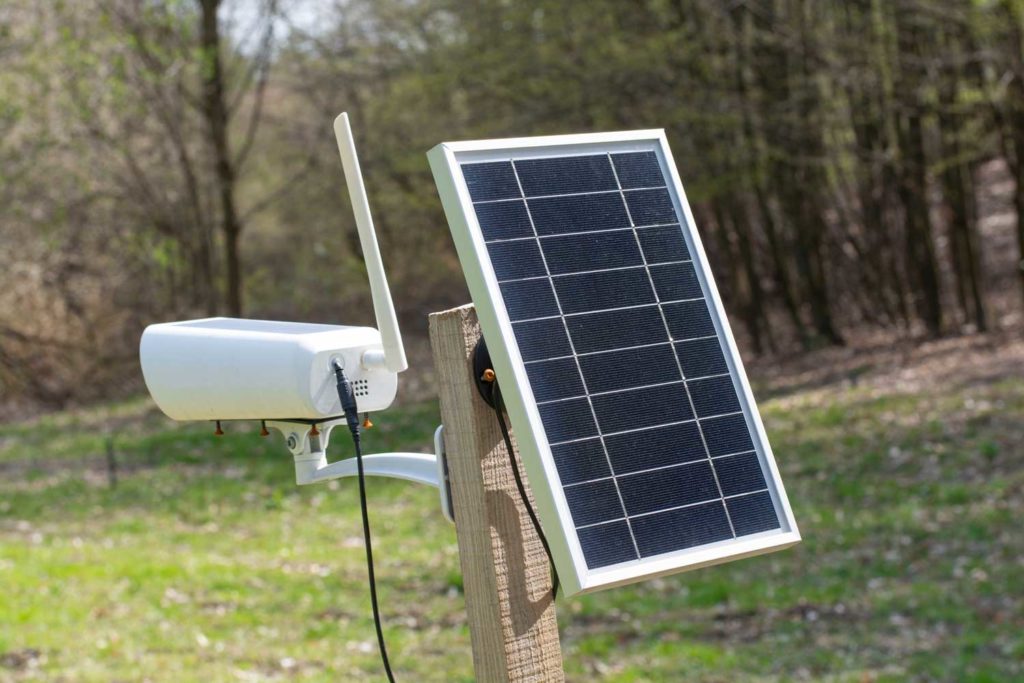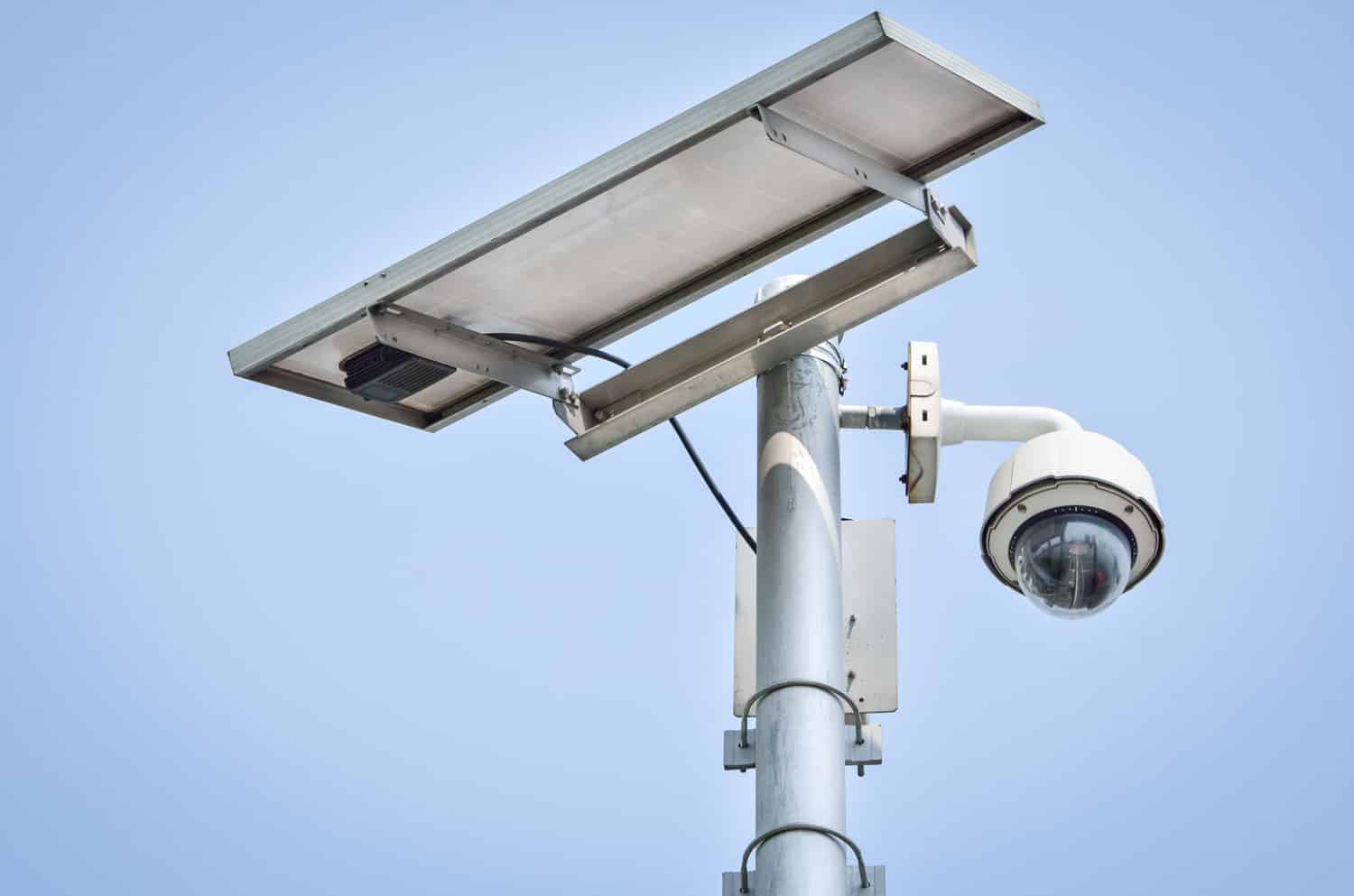Security providers offer both wired and wireless video surveillance systems. But what if you don’t have internet or electricity on your job site? Fortunately, there are cameras built for these situations. If you’re a business owner or manager who has ever found themselves wondering, “can security cameras work without Wi-Fi,” the answer is yes! Many surveillance cameras are designed to function even without internet connectivity. Here’s what you need to know about these setups and how to use them.
Can Wireless Cameras Work without Internet?
A wireless security camera can work without the internet, but its functionality may be limited compared to online cameras. For example, outdoor security cameras without Wi-Fi can record footage directly onto a hard drive or on micro-SD cards. These are called IP (Internet Protocol) cameras. Despite the acronym “internet protocol,” you don’t have to connect these cameras to the internet. They typically use your Wi-Fi, a USP, or an Ethernet cable to reach a network video recorder (NVR).
So, can a Wi-Fi camera work without the internet? Here are four options to consider:
-
Local recording: Many wireless security cameras are equipped with built-in storage options such as SD cards or onboard storage. These cameras can record video footage directly to the storage device without the need for an internet connection. The recorded footage can be accessed locally by physically removing the storage device or by connecting to the camera directly through a local network (Wi-Fi or Bluetooth).
-
Motion detection and alerts: Some wireless security cameras have motion detection capabilities. These trigger a recording or send alerts to a connected device (like a smartphone or tablet) when motion is detected. These alerts can be received over a local Wi-Fi network even without an internet connection.
-
Closed-circuit systems: You can set up a closed-circuit system using multiple wireless security cameras and a network video recorder (NVR). The NVR is a device that can store video footage from the cameras and manage their recordings. While the NVR might not require an internet connection to operate, it can connect to a local network for easier access and monitoring.
-
Local viewing: Many wireless security cameras come with mobile apps or software. These tools allow you to view live footage and access recorded videos directly from the camera within your local network range. You can monitor your cameras even without an internet connection, as long as you are connected to the same local network as the cameras.
The Pros of Security Cameras Without the Internet
So, we’ve covered that the answer to the question “do wireless security cameras need Wi-Fi?” is no, but understanding the trade-offs is essential. Let’s first look at the positives of using security cameras that don’t have Wi-Fi capabilities, and then look at the negatives.
One pro of a wireless camera without internet is that you can’t have a data or privacy breach.
Wireless cameras that keep data inside your four walls will never be breached by hackers. Internet-connected cameras can be vulnerable to cyberattacks. For example, Ring home security systems made the news a year or so ago when hackers hijacked the signal and started watching people inside their homes. That’s because the cameras ran a live feed online. Cameras that generate video footage locally are generally more secure and private.
Another positive of wireless cameras without the internet is you won’t pay fees for storing your video data in the cloud. Internet-connected security cameras can require a subscription service for cloud storage and remote access. You’ll have better bandwidth if you have an internet connection but choose to leave your cameras offline. Online cameras consume a significant amount of bandwidth. It can affect the performance of other connected devices in your business.
Internet outages or connectivity issues can disrupt functionality of internet-connected cameras. Instead, your camera footage will be stored on physical hardware inside your building.
Your surveillance cameras can keep running, using battery power, even when there is a power outage. This is a huge advantage from a security perspective. Your business bandwidth won’t be slowed by video surveillance.
On the other hand, what features will you miss if you install wireless cameras without access to the internet?
The Cons of Security Cameras Without the Internet
If you’ve ever searched “do you need internet for security cameras,” the answer depends on how much remote access and control you require for your business.
One of the primary drawbacks of security cameras without internet access is the inability to access the camera remotely. In other words, without an internet connection, you won’t be able to view the live feed or recorded footage from a remote location. which limits the ability to monitor your property while you’re away from work. Your security team won’t be able to check the video feed in real-time from a PC, phone or tablet, either.
Being able to remotely monitor a live video feed is a huge benefit for internet-connected surveillance systems. You, or your trusted security team, can literally use a phone to connect to an internet app. Then you can view through the eyes of the cameras at your business anytime, 24/7. Without it, you won’t receive alerts if there is an intruder at your business.
Internet-connected surveillance cameras often come with software that can text security alerts to you or your security professionals. You’ll lose this benefit, however, if you install wireless surveillance cameras without connecting to the internet. Your data will be stored on-site on a DVR or a micro-SD card.
While this means it can’t be hacked, it also means it is vulnerable to physical theft. If your business is broken into, thieves could take the DVR right out of an office, for example. Also, the footage will have to be maintained. That means you’ll have to monitor the storage unit, since it will eventually run out of space.
You also won’t be able to take advantage of two-way communication features. Modern internet-connected IP cameras allow your security team to communicate through the camera to someone on-site. There’s a level of control that comes with using the internet that gives business owners a lot of flexibility.
Sharing video with law enforcement or others may be more cumbersome without the internet connectivity. You physically have to retrieve the storage device and manually transfer the data to a storage medium.
We should also mention that battery-operated surveillance cameras have a finite operation time. Eventually the battery will run out. To prevent this, you should look for wireless surveillance cameras that include solar panels to keep the battery constantly charged.
Wireless surveillance cameras without the internet are necessary for many situations. Let’s look at what kinds of businesses could benefit from having remote surveillance cameras without the internet.
Why Would a Business Need Wireless Surveillance Without the Internet?
There are two primary scenarios that could justify surveillance infrastructure without using the internet and all the rich features it offers.
- First, the business could simply not have internet access on every part of the property – common for ranches, oil & gas production facilities, and more.
-
Alternatively, you have internet access, but you don’t want the IP camera to gobble up too much bandwidth.
In both of these situations, a wireless surveillance camera without the internet will keep your business safer than it would be without any cameras at all. Understanding how wireless security cameras work, even without internet, will help businesses like yours make the best decisions for their security needs.
Industries With Extra Vulnerabilities
Construction sites often lack internet connectivity. However, 21% of construction sites in the U.S. experience onsite theft every week, making it critical to safeguard them. You can set up IP cameras to connect wirelessly to the cell network. However, it may be faster and more cost-effective to deploy wireless surveillance cameras without internet.
These sites not only often lack internet, but they also can lack electricity. They may not even have stable, permanent structures to set up video surveillance units. The answer in these situations is to set up a portable security system with wireless surveillance cameras that store data in the cameras themselves.
One key industry that appreciates security cameras that don’t need internet access is the agricultural business. Farms and ranches often have remote areas with no electricity or internet.
This is a problem because 58% of these business owners experience crime. Farm owners need a way to watch large swathes of land, equipment, and assets. Wireless surveillance cameras can work without the internet and can even be connected to solar panels for uninterrupted service.
Another industry that loves having access to high-quality security cameras that don’t need internet access is warehouses. Sprawling warehouse facilities, such as ecommerce fulfillment businesses, need security solutions that protect them.
Hardwiring video surveillance is a costly and time-consuming option. Spotty internet can also be a potential problem if you’re seeking a video surveillance solution. The answer could be wireless surveillance cameras that don’t need the internet.
Security Options for Rural Locations
The truth is that criminals target rural areas, sprawling locations, and businesses that have dark nooks and crannies to hide it. Wouldn’t it be great to know that you have many options for video surveillance? For example:
The reality is you have many options when considering video surveillance. Whether you need security cameras that connect to the internet easily over Wi-Fi, or if you need wireless security cameras that can work just as well without an internet connection, you can identify options that fit your business and its unique needs.
One of the benefits of working with experts like Pro-Vigil is that we can design and deploy video security that fits almost any requirement. No matter your business security goals, we can help you achieve them with state-of-the-art video surveillance tools. Call on our team today to find out more.








